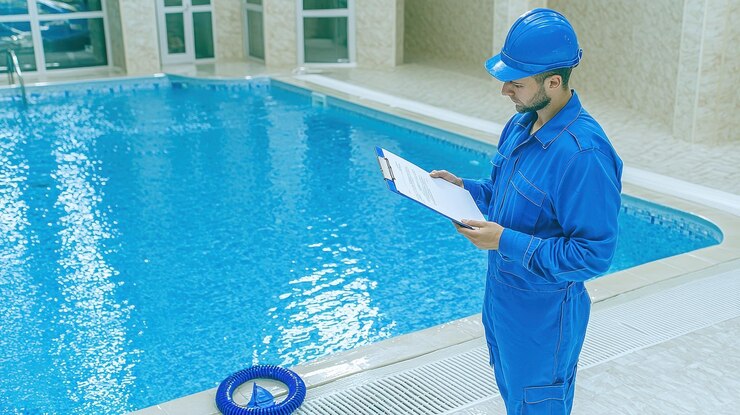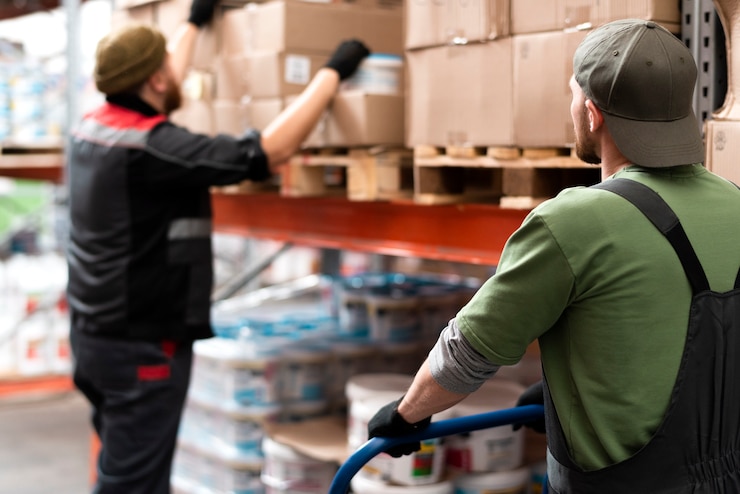
by johnsean | May 20, 2025 | Others
Building a swimming pool in Dubai offers many benefits, including a luxurious space to relax, exercise, and enjoy with friends and family. The city’s warm climate makes pools a sought-after addition to both residential and commercial properties. Whether you want a space for relaxation or a stylish entertainment feature, understanding the process of swimming pool construction in Dubai is essential for a successful outcome. This guide will take you through the important aspects of constructing a swimming pool in Dubai, from initial planning to completion.
The Importance of Pools in Dubai’s Climate
Dubai’s hot climate, with temperatures regularly exceeding 40°C in summer, makes having a swimming pool a perfect way to beat the heat. Pools not only provide a refreshing escape but also serve as a luxurious feature that adds value to your property. In Dubai, a pool can transform a basic garden into an inviting oasis, offering a place for family gatherings, parties, or a private retreat. Whether it’s a family home, villa, or hotel, a pool is an ideal way to enjoy the outdoors in comfort throughout the year.
Choosing the Right Pool Type for Your Property
Selecting the right type of pool for your property depends on your space, budget, and the aesthetic you wish to achieve. Each pool type has its own set of advantages and considerations that you should weigh carefully before deciding on the most suitable one.
Concrete Pools
Concrete pools are the most popular choice for those seeking a customized pool design. These pools are built using a steel frame, and concrete is poured over it to form the structure. One of the main benefits of a concrete pool is the ability to customize it to any shape, size, or depth, making it a versatile option for various properties. Concrete pools are also incredibly durable, able to withstand the harsh climate of Dubai for years. However, they require longer installation times compared to other types of pools.
Fiberglass Pools
Fiberglass pools are pre-fabricated and shipped to your property as one large piece. The main advantage of fiberglass pools is their quick installation process. Since the pool is delivered ready to be installed, it reduces construction time significantly. They are also highly durable, resistant to algae growth, and require less maintenance than concrete pools. However, fiberglass pools have limited customization options, and the shape and size are typically restricted to the designs available in the factory.
Vinyl Liner Pools
Vinyl liner pools consist of a flexible vinyl liner that is fitted over a frame made of steel or polymer. These pools are a budget-friendly option and are highly customizable in terms of shape and size. Vinyl liner pools are easier and faster to install than concrete pools, making them a good choice for those on a tighter budget. However, the vinyl liner will need to be replaced every 7-10 years due to wear and tear from exposure to the elements.
The Swimming Pool Construction Process in Dubai
Constructing a swimming pool in Dubai involves several critical steps, each of which must be handled professionally to ensure the final result is exactly as you envision.
Initial Design and Planning
The first step in the pool construction process is designing the pool according to your specific needs. During this stage, a pool contractor will help you decide on the size, shape, and type of pool that fits best with your available space and budget. The pool’s location on your property is also crucial. It should be positioned in an area that maximizes sunlight exposure, as well as ensuring it is close to essential utilities like water and electricity. It’s also important to take into account the surrounding landscape and architecture to create a cohesive and visually pleasing design.
Obtaining Necessary Permits
In Dubai, you are required to obtain permits from the local municipality before beginning construction. These permits are necessary for legal and safety reasons. Your contractor will typically handle the permit application process, ensuring that the pool design complies with local regulations. The permits may include approvals for the pool’s location, depth, and safety features.
Excavation and Construction
Once the permits are approved, excavation begins. Depending on the pool type, the excavation process may vary. For concrete pools, a large hole is dug in the shape and size of the pool design. The excavation process is critical to ensuring the pool has proper drainage and structural support. For fiberglass and vinyl liner pools, the hole is smaller as the pre-made pool shells are lowered into place. After excavation, the pool’s structure is built using concrete, fiberglass, or vinyl, and the necessary plumbing and electrical systems are installed.
Finishing Touches and Landscaping
Once the pool structure is complete, the finishing touches begin. This includes installing the pool’s surface, which could be plaster, tiles, or fiberglass. Once the surface is set, the pool is filled with water, and the filtration and heating systems are tested to ensure they work properly. Landscaping around the pool is also an important part of the construction process. This could include adding features such as decking, pathways, lighting, and plants to create a relaxing and aesthetically pleasing environment.
Factors to Consider Before Building a Pool in Dubai
Before proceeding with your swimming pool construction project, consider several factors to ensure the pool is both practical and enjoyable for years to come.
Budget
The cost of building a swimming pool in Dubai can vary widely depending on the type of pool, its size, and the complexity of the design. Concrete pools are typically more expensive than fiberglass or vinyl liner pools, but they offer greater customization options. It’s important to establish a clear budget and work with a contractor who can help you stay within it while still achieving the desired outcome.
Pool Maintenance
Swimming pools require regular maintenance to keep them clean, functional, and safe. This includes cleaning the pool, balancing the chemicals in the water, and inspecting the filtration system. Some pool types, like fiberglass, are easier to maintain than others. When designing your pool, consider incorporating low-maintenance materials and equipment to make upkeep easier.
Safety and Regulations
In Dubai, there are strict safety regulations regarding swimming pools, especially for residential properties with children. Pools must be equipped with barriers or fences to prevent accidents. Your pool contractor will ensure that your pool complies with all safety standards, including features like non-slip surfaces, pool covers, and alarms.
Conclusion
Swimming pool construction in Dubai is an exciting investment that brings luxury and comfort to your property. With the right planning, design, and construction process, you can enjoy a refreshing and functional pool that suits your needs. By considering factors such as pool type, location, budget, and maintenance, you can make an informed decision that leads to a successful pool project in the heart of Dubai.

by johnsean | May 20, 2025 | Others
Choosing the right carton packaging supplier in the UAE is a crucial step for businesses that rely on efficient, durable, and cost-effective packaging solutions. Whether you run a retail store, an e-commerce platform, or a manufacturing unit, the need for high-quality packaging materials cannot be overstated. A dependable supplier ensures your products are protected during transit, look professional on arrival, and reflect your brand’s commitment to quality. With the UAE’s fast-paced commercial growth and logistical advancements, carton packaging plays a vital role in supply chains and product distribution.
The local market offers a wide range of options, from corrugated box manufacturers to custom packaging providers. This variety can make it challenging to select the right vendor. Factors such as box durability, customization options, minimum order quantities, and delivery timelines all come into play. Furthermore, eco-friendly packaging is increasingly becoming a top priority for many companies, adding another layer of consideration. In this guide, we’ll walk you through everything you need to know when selecting a carton packaging supplier in the UAE. We’ll explore the types of packaging available, what features to consider, and how to evaluate suppliers without bias or brand preference.
Understanding Carton Packaging Needs
Before reaching out to any supplier, businesses must first evaluate their packaging requirements. Carton packaging serves different purposes depending on the product, industry, and shipping method.
Key Questions to Ask:
-
What type of product are you packaging?
-
Will the boxes be used for storage, shipping, or display?
-
Do you need plain or printed cartons?
-
Are you looking for single-wall or double-wall corrugated boxes?
By answering these questions, you can better communicate your needs to a potential supplier. A clear understanding also helps in comparing quotes and evaluating product suitability.
Types of Carton Packaging Available in the UAE
The UAE market offers various types of carton boxes designed for different uses. Understanding each type helps you choose the most appropriate option.
1. Corrugated Carton Boxes
These are the most common and widely used for shipping and storage. Made from fluted paperboard sandwiched between two flat liners, they provide strength and durability.
2. Die-Cut Cartons
Ideal for specific product shapes, these custom-designed boxes offer precision in size and structure. They are perfect for electronics, cosmetics, and promotional packaging.
3. Folding Cartons
Used mostly for retail and food packaging, folding cartons are lightweight and customizable. They are often made from paperboard.
4. Rigid Boxes
These high-end boxes are used for premium products such as electronics, jewelry, and luxury goods. They are sturdy and offer a high level of protection.
Important Features to Consider in a Supplier
When evaluating a carton packaging supplier in the UAE, consider more than just the price. The right partner will offer value in quality, service, and long-term support.
1. Material Quality
Check if the supplier uses high-quality, durable materials like Kraft paper or corrugated fiberboard. Box strength is essential to protect contents during shipping.
2. Customization Options
Look for a supplier that can offer custom sizes, shapes, and printing. This helps you align packaging with your brand’s identity and product needs.
3. Minimum Order Requirements
Some suppliers require high order volumes. Make sure their minimum order quantity (MOQ) fits your budget and storage capacity.
4. Lead Time
Timely delivery is essential to avoid supply chain disruptions. Ask about standard production timelines and how they handle urgent orders.
5. Eco-Friendly Practices
Many UAE businesses now prefer sustainable packaging solutions. Look for suppliers that offer recyclable or biodegradable cartons and use environmentally conscious manufacturing practices.
Questions to Ask a Carton Box Supplier
When you’ve shortlisted a few suppliers, prepare to ask them detailed questions. This will help you evaluate their capabilities and reliability.
-
What is your average production time for standard and custom orders?
-
Can you provide samples before bulk production?
-
Do you offer printing or branding services on the cartons?
-
What type of materials do you use for manufacturing?
-
What is your return or replacement policy in case of defects?
-
Are your cartons compliant with international shipping standards?
Answers to these questions will give you insight into the supplier’s professionalism, transparency, and suitability for your business.
Evaluating Supplier Reliability
A strong supplier relationship is built on trust and consistency. To ensure reliability, check the following:
1. Years in Business
Suppliers with years of experience often have a better understanding of quality control, logistics, and customer service.
2. Client Reviews and Testimonials
Look for online reviews or ask for references. Feedback from other businesses helps gauge the supplier’s credibility.
3. Certifications
Suppliers that comply with ISO standards or have certifications related to sustainable manufacturing practices show a commitment to quality.
4. Logistics and Distribution Network
A well-established distribution system ensures timely delivery across the UAE, including cities like Dubai, Abu Dhabi, Sharjah, and Ajman.
Local vs International Suppliers
Some UAE-based businesses consider international suppliers for bulk orders. However, local suppliers often offer significant advantages.
Benefits of Local Carton Suppliers:
-
Faster delivery timelines
-
Easy communication and coordination
-
No import duties or customs delays
-
Better support for repeat or urgent orders
While international options may offer slightly lower pricing, the additional logistics cost and time delays can affect your bottom line.
Packaging Trends in the UAE
The UAE packaging market is adapting to new trends and customer preferences. Here are a few notable trends influencing carton packaging:
1. Sustainable Packaging
Companies are opting for recyclable cartons and biodegradable materials to reduce environmental impact.
2. Minimalist Designs
Clean, simple designs with fewer printing elements are becoming popular, especially for e-commerce businesses.
3. Smart Packaging
Some brands integrate QR codes and tracking features into their packaging to improve customer engagement.
4. Lightweight Packaging
With rising courier and fuel costs, businesses prefer lighter carton materials without compromising on strength.
Tips for Long-Term Supplier Partnerships
Once you’ve found a reliable carton packaging supplier in the UAE, it’s important to build a long-term relationship.
1. Maintain Regular Communication
Keep suppliers updated about upcoming orders and potential changes in volume or design.
2. Provide Feedback
Constructive feedback helps suppliers improve and tailor their offerings to your needs.
3. Negotiate Long-Term Contracts
Securing a contract with favorable pricing and delivery terms can benefit both parties in the long run.
4. Plan for Seasonal Demand
If your business experiences seasonal peaks, inform the supplier in advance to ensure smooth fulfillment.
Conclusion
Choosing the right carton packaging supplier in the UAE is about more than finding the lowest price. It involves understanding your packaging needs, evaluating product quality, and partnering with a supplier who aligns with your business goals. Consider material durability, customization options, and eco-friendly practices. Look beyond short-term costs and invest in a long-term relationship that supports your business growth. The UAE’s packaging market offers many capable suppliers—it’s up to you to identify the one that meets your expectations for quality, reliability, and service

by johnsean | May 20, 2025 | Health
Blood sugar control is essential for maintaining overall health, especially in a bustling city like Dubai. With its fast-paced lifestyle and diverse food options, managing blood sugar levels can be challenging but is incredibly important, particularly for those at risk of diabetes. Understanding how to regulate your blood sugar effectively can help you live a healthier and more energetic life.
Understanding Blood Sugar and Its Importance
Blood sugar, or glucose, is the body’s primary source of energy. It comes from the foods we eat, especially carbohydrates. When you eat, your body breaks down the food into glucose, which enters your bloodstream. The hormone insulin, produced by the pancreas, helps your cells absorb glucose for energy. However, if the body doesn’t produce enough insulin or if cells become resistant to it, blood sugar levels can rise, leading to conditions like prediabetes or diabetes.
For those living in Dubai, with its high temperatures and active urban lifestyle, maintaining stable blood sugar is crucial. Here are some key strategies to help you manage your blood sugar effectively.
1. Balanced Diet: Key to Blood Sugar Control
Eating a balanced diet is one of the most effective ways to regulate blood sugar. Focus on foods that help maintain stable glucose levels and avoid spikes. These include:
-
- Whole grains: Brown rice, quinoa, and oats have a low glycemic index, meaning they don’t cause rapid increases in blood sugar.
-
- Fruits and vegetables: Opt for non-starchy vegetables like spinach, cucumbers, and broccoli. Fruits such as berries, apples, and pears are excellent choices for those aiming to control their blood sugar.
-
- Healthy fats: Incorporate healthy fats from avocados, nuts, seeds, and olive oil to improve insulin sensitivity.
-
- Lean proteins: Include lean meats like chicken, turkey, and fish, as well as plant-based proteins like beans and lentils.
Avoid processed foods high in refined sugars and carbs, such as sugary snacks, sodas, and white bread, as they can cause rapid spikes in blood sugar.
2. Exercise Regularly
Regular physical activity is crucial for blood sugar control. Exercise helps your body use insulin more effectively and allows your muscles to absorb glucose for energy, even when insulin levels are low. Aim for at least 30 minutes of moderate-intensity exercise most days of the week. In Dubai, with its warm climate, try to schedule outdoor activities like walking, cycling, or swimming during the cooler hours of the day, such as early morning or late evening.
Yoga and Pilates are also great low-impact exercises that can help improve flexibility, reduce stress, and support overall well-being. Combining cardio with strength training, like weightlifting, can further boost your blood sugar management.
3. Hydration is Key
In Dubai’s hot climate, staying hydrated is essential for everyone, especially for those managing blood sugar. Dehydration can lead to high blood sugar levels, as the body struggles to expel excess glucose through urine. Drinking water consistently throughout the day helps prevent dehydration and supports kidney function, which plays a role in regulating blood sugar.
Avoid sugary beverages like sodas, energy drinks, or excessive fruit juices, as they can contribute to elevated blood sugar levels. Herbal teas or infused water with lemon, mint, or cucumber can be refreshing alternatives.
4. Monitor Your Blood Sugar Regularly
For those at risk of diabetes or managing blood sugar levels, regularly monitoring blood glucose levels is crucial. This helps you understand how different foods, activities, and even stress levels affect your blood sugar. Regular monitoring will give you a clearer picture of your progress and help you make necessary adjustments to your lifestyle.
In Dubai, many healthcare providers offer glucose testing kits and monitoring tools. If you’re unsure about how often you should check your levels, it’s advisable to consult with a healthcare professional who can guide you based on your health profile.
5. Managing Stress
Stress has a significant impact on blood sugar levels. When you’re stressed, your body releases hormones like cortisol and adrenaline, which can raise blood glucose levels. Managing stress through mindfulness practices like meditation, deep breathing exercises, or even spending time in nature can help regulate your blood sugar. Dubai offers plenty of spaces like parks, beaches, and desert retreats where you can find tranquility away from the city hustle.
Regular sleep is also crucial, as lack of sleep can increase insulin resistance and disrupt blood sugar regulation. Aim for 7 to 8 hours of quality sleep each night.
6. Opt for Smaller, Frequent Meals
Instead of eating large meals that can cause blood sugar spikes, consider eating smaller, more frequent meals throughout the day. This can help maintain stable glucose levels and prevent overeating. Balanced snacks between meals—such as a handful of nuts, a piece of fruit, or some yogurt—can be great options to maintain your energy levels and blood sugar balance.
7. Seek Professional Guidance
If you’re struggling to manage your blood sugar, it’s always a good idea to seek professional guidance. Nutritionists and dieticians in Dubai can provide personalized advice on managing your blood sugar through dietary changes. Additionally, endocrinologists can offer medical advice and medications if necessary to help you regulate your blood sugar levels effectively.
Conclusion
Blood sugar control is a critical aspect of maintaining overall health, particularly in a fast-paced city like Dubai. By adopting a balanced diet, exercising regularly, staying hydrated, managing stress, and monitoring your blood sugar, you can maintain optimal blood sugar levels and lead a healthier life. It’s important to remember that controlling blood sugar is not about drastic changes but rather about consistency and small adjustments that fit into your lifestyle

by johnsean | May 20, 2025 | Transportation
Marine safety is crucial for protecting lives, vessels, and the environment in the UAE’s waters. With its extensive coastline along the Arabian Gulf, the UAE has a thriving maritime industry, including commercial shipping, fishing, and recreational boating. Ensuring safety at sea involves understanding regulations, following best practices, and using appropriate safety equipment. Authorities like the UAE Maritime Administration and the Federal Transport Authority (FTA) enforce strict guidelines to maintain marine safety. Whether you are a professional mariner or a recreational boater, knowing the essential safety measures can help prevent accidents and protect the marine ecosystem.
Importance of Marine Safety in the UAE
The UAE has a dynamic maritime sector, making marine safety a top priority. Here’s why marine safety is essential:
-
Protection of Lives: Accidents at sea can lead to injuries or fatalities, making adherence to safety protocols vital.
-
Environmental Conservation: Oil spills, chemical leaks, and waste disposal can harm marine life and ecosystems.
-
Legal Compliance: Following UAE maritime laws ensures smooth operations and prevents penalties.
-
Economic Stability: The shipping and tourism industries rely on safe marine transport.
-
Disaster Prevention: Awareness and preparedness reduce risks of vessel collisions, capsizing, and onboard fires.
Marine Safety Regulations in the UAE
The UAE has strict laws to enhance maritime safety. Key regulations include:
1. Vessel Registration and Inspection
All boats and ships in the UAE must be registered with the FTA. Authorities conduct regular inspections to ensure vessels meet safety standards.
2. Crew Certification and Training
Seafarers must hold valid certifications, including competency licenses. Proper training in emergency procedures, navigation, and firefighting is mandatory.
3. Navigation and Traffic Rules
The UAE enforces maritime traffic rules, such as:
-
Keeping safe distances between vessels.
-
Following designated sea routes.
-
Using navigation lights at night and during low visibility.
4. Mandatory Safety Equipment
Every vessel must carry essential safety equipment, including:
5. Environmental Protection Laws
To prevent pollution, the UAE has regulations on waste disposal and oil spill management. Vessels must follow strict guidelines for handling fuel and chemicals.
Best Practices for Marine Safety
1. Regular Maintenance and Inspection
Ensuring vessels are in good condition prevents mechanical failures. Routine checks on engines, navigation systems, and safety gear are essential.
2. Weather Monitoring
Before heading out to sea, boaters should check weather forecasts. Strong winds and high tides can increase risks of accidents.
3. Emergency Preparedness
Vessel operators should:
-
Conduct emergency drills.
-
Have clear evacuation plans.
-
Maintain communication devices such as VHF radios.
4. Safe Navigation Practices
-
Avoid overloading vessels.
-
Follow speed limits in restricted zones.
-
Stay alert for other boats, swimmers, and floating objects.
5. Use of Personal Protective Equipment (PPE)
Wearing life jackets and harnesses can save lives during emergencies. Safety gear should be easily accessible on board.
Common Marine Safety Risks in the UAE
Understanding potential risks can help prevent accidents. Some common hazards include:
-
Capsizing: Often caused by overloading, sudden weather changes, or reckless maneuvering.
-
Collisions: Due to poor visibility, navigation errors, or high traffic in busy ports.
-
Fire Hazards: Electrical malfunctions and fuel leaks can lead to onboard fires.
-
Drowning Incidents: Failure to wear life jackets increases drowning risks in emergencies.
-
Engine Failures: Mechanical issues can leave vessels stranded at sea.
Emergency Response and Rescue Services
The UAE has well-equipped maritime rescue teams. In case of an emergency, boaters should:
-
Contact the UAE Coast Guard using distress signals or emergency channels.
-
Stay calm and follow safety protocols.
-
Use emergency rafts or flotation devices if necessary.
Conclusion
Marine safety in the UAE is essential for protecting lives, property, and the marine environment. Following regulations, maintaining vessels, and practicing safe navigation can prevent accidents.

by johnsean | May 20, 2025 | Beauty Care
Introduction: Why Choosing the Right Cleaning Company Matters
Living in a fast-paced environment like Dubai means people often struggle to manage household or office cleaning on their own. Whether you live in a high-rise apartment or run a business in a commercial tower, maintaining cleanliness is essential. But finding the best cleaning company in Dubai is not just about hiring someone to mop the floor. It’s about professionalism, reliability, and efficiency.
Dubai, known for its high standards in lifestyle and services, offers a wide range of cleaning solutions. From residential cleaning to commercial deep cleaning, the industry caters to diverse needs. With numerous cleaning firms available, how do you choose the right one? This guide walks you through the important considerations when selecting a professional cleaning company in Dubai, so you make a well-informed decision that suits your needs and budget.
Understanding Different Types of Cleaning Services
Before hiring any service, it’s important to understand the different categories of cleaning available in Dubai.
1. Residential Cleaning
This includes daily or weekly cleaning for homes, apartments, and villas. It typically covers dusting, mopping, bathroom cleaning, kitchen sanitization, and laundry folding.
2. Commercial Cleaning
Offices, retail outlets, and warehouses often require specialized cleaning solutions. These companies use industrial-grade equipment to maintain hygiene in high-traffic areas.
3. Deep Cleaning
This is a more intensive service that targets hidden dirt, built-up grime, and bacteria. It’s ideal for seasonal cleanups or pre/post-tenancy situations.
4. Move-In/Move-Out Cleaning
These services are helpful when shifting homes or offices. Cleaners ensure the place is spotless for the next occupant.
5. Post-Construction Cleaning
New builds or renovations create a lot of dust and debris. Post-construction cleaning involves detailed work to make the space livable or usable.
Key Factors to Consider When Choosing a Cleaning Company
Selecting the best cleaning company in Dubai means evaluating multiple aspects. Here’s what you should look for:
1. License and Insurance
Make sure the cleaning firm is legally registered in the UAE and has insurance coverage. This protects you in case of damage or accidents during service.
2. Experience and Reputation
A company that has been in the industry for several years is more likely to offer dependable service. Check online reviews and client feedback to assess reputation.
3. Trained and Vetted Staff
Professional cleaning companies invest in training their employees. Also, make sure the staff undergoes background checks for safety and security.
4. Eco-Friendly Cleaning Products
With sustainability becoming a global priority, many cleaning firms in Dubai now use non-toxic, biodegradable products. Ask if green cleaning is an option.
5. Customizable Cleaning Packages
Every space has different cleaning needs. A good company should offer flexible packages that can be tailored to your schedule and specific requirements
Common Services Offered by Top Cleaning Companies in Dubai
Here are some of the most in-demand services provided by reliable cleaning firms in the UAE:
-
Sofa and carpet shampooing
-
Mattress deep cleaning
-
Kitchen and bathroom sanitization
-
Window and glass cleaning
-
AC duct cleaning
-
Disinfection and sterilization services
-
Marble and tile polishing
Many companies also offer hourly cleaning, which is suitable for quick touch-ups or single-room maintenance.
Pricing Structure and What to Expect
Cost is always a key consideration, but it shouldn’t be the only one. Here’s how cleaning services are usually priced in Dubai:
-
Hourly Rate: AED 30 to AED 50 per hour depending on the type of service and whether cleaning materials are provided.
-
Flat Rates: Often applied for deep cleaning, move-in/move-out, and specialized cleaning tasks.
-
Subscription Packages: Weekly or monthly contracts offer discounted rates for long-term commitments.
Always ask for a quotation before confirming the booking. Make sure it includes all potential extra charges such as transportation, cleaning supplies, or VAT.
Tips for Booking a Reliable Cleaning Service
Here are some practical steps to follow when you’re ready to book a cleaning service:
-
Define Your Needs
Are you looking for a one-time cleaning or a recurring service? Knowing what you want helps narrow down your options.
-
Ask the Right Questions
Clarify what services are included, whether supplies are provided, and what their cancellation policies are.
-
Check Reviews and Ratings
Use Google, Yelp, or UAE-based review platforms to evaluate feedback from previous customers.
-
Trial Run
If unsure, book a one-time service first. If satisfied, you can continue with regular bookings or a contract.
-
Look for Transparent Communication
Good companies offer easy booking, quick replies, and clear terms. If a firm seems evasive, it’s better to avoid them.
Cleaning Standards in Dubai: Why They Matter
Dubai has high expectations when it comes to hygiene, especially in commercial spaces. Restaurants, hospitals, and offices must meet specific cleanliness criteria set by Dubai Municipality. A certified cleaning firm understands these standards and helps you stay compliant. This is particularly crucial for businesses in sectors like healthcare and food.
The Role of Technology in Cleaning Services
Many of the top cleaning firms in Dubai now use advanced tools to improve efficiency. For example:
-
Steam cleaning machines for deep sanitization
-
HEPA vacuum cleaners to trap fine particles
-
UV light disinfection to kill viruses and bacteria
-
Mobile apps for easy booking and tracking
These innovations not only ensure better cleaning but also save time and reduce human error.
When Should You Hire a Cleaning Company?
Here are situations where hiring a cleaning firm makes sense:
-
After hosting a party or event
-
During the change of seasons
-
Before or after guests visit
-
When moving into a new place
-
For spring or annual cleaning
-
To maintain hygiene during flu or allergy season
Mistakes to Avoid When Hiring a Cleaning Service
-
Choosing the Cheapest Option
Low prices often mean lower quality. Look for value, not just affordability.
-
Not Checking Credentials
Always verify if the company is registered and follows safety protocols.
-
Overlooking the Fine Print
Read the terms and conditions carefully to avoid hidden charges.
-
Skipping a Walkthrough
If you’re booking a detailed service, request an on-site evaluation first.
Conclusion: Make an Informed Choice
Selecting the best cleaning company in Dubai takes more than a quick Google search. You need to assess your needs, compare services, and check for reliability. Whether you’re hiring for your home or your business, quality cleaning services can save you time, boost hygiene, and add comfort to your life.
Dubai’s professional cleaning industry is evolving. With options ranging from one-time deep cleans to eco-friendly and tech-enabled services, there’s a solution for everyone. Choose wisely, and you’ll never have to worry about dust, dirt, or disorganization again.





